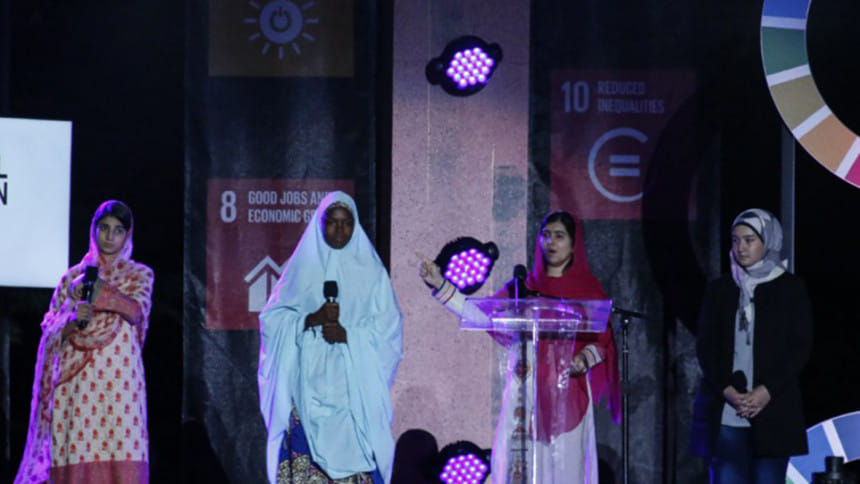Pop stars, world leaders rally to end poverty

Some of the biggest names in music and politics from Beyonce to European prime ministers rallied Saturday in a concert aimed at mobilizing action to eradicate extreme poverty.
Before thousands of people in New York's Central Park and a far greater audience on television, the Global Citizen Festival sought to use entertainment to broaden support for new United Nations development goals.
Beyonce, playing just her second concert this year, was the top attraction for many fans who obtained tickets not by paying but by committing to activism ranging from writing letters to volunteering.
Other performers included rock veterans Pearl Jam and Coldplay, fresh English pop sensation Ed Sheeran, socially conscious rapper Common and -- in an effort to raise the profile of the festival in India -- leading Bollywood singer Sunidhi Chauhan.
Beyonce closed an energetic set by welcoming to the stage a surprise guest she hugged warmly -- Michelle Obama.
The US first lady encouraged the audience to use social media to campaign on behalf of the estimated 62 million girls worldwide who are not in school.
"They deserve the same chances to get an education as my daughters and your daughters and all of our children," she said.
"And make no mistake about it -- giving them that chance is at the core of our work to end global poverty."
On Friday, the UN endorsed a goal of ending extreme poverty by 2030 -- in part by focusing on opportunities for girls, an investment with sweeping consequences for families' futures.
- Raising pressure for aid -
Despite wide official endorsements of the so-called Sustainable Development Goals, the UN estimates that achieving them would cost the world up to $5 trillion each year -- a huge commitment.
US Vice President Joe Biden, another unannounced guest at the festival, voiced optimism that the goal was within reach if citizens mobilized.
"At no time in history has so much power been available to make such a difference for so many people," Biden said.
The prime ministers of Luxembourg, Malta, Norway and Sweden came to the festival to offer support, with US President Barack Obama and British Prime Minister David Cameron appearing by video.
Prime Minister Erna Solberg of Norway, one of the world's top donors, said that the festival should serve as a catalyst for a "massive increase in educational funding."
She called for the world to ensure that all children in the world can attend school for 12 years, with nine years compulsory.
"We have the power to turn the dreams of millions of children into reality, so let's start now," she said.

- Musical twists -
Like many festivals, the concert thrived on musical surprises.
Pearl Jam brought back to stage Beyonce for Bob Marley's inspirational "Redemption Song," which segued to a video of late anti-apartheid hero Nelson Mandela urging a fight against poverty.
Beyonce put on a crowd-rousing show of dance pop with an emphasis on her feminist themes but performed an unlikely acoustic duet with Sheeran of "Drunk in Love," which she usually sings with husband Jay Z.
Pop starlet Ariana Grande joined Coldplay, while Common's hard-charging hip-hop set merged into "Every Breath You Take" as a bearded Sting suddenly appeared.
Taking the microphone in between pop stars, the youngest-ever Nobel Peace Prize winner Malala Yousafzai dramatized the plight of girls who want to go to school.
The 18-year-old Pakistani, who was shot in 2012 for defying a Taliban ban on education, said that the world did not lack money.
"We have billions and trillions of dollars but where the money goes is the military, things that are useless to society," she said.
"It is a book and a pen that can change the life of a child; it is not a gun."
Hollywood star Leonardo DiCaprio urged the world also to reach a deal on climate change, warning that rising temperatures and disasters risked making poverty all the more daunting.
"Right now, Europe is paralyzed trying to absorb the influx of millions of Syrian refugees," the "Titanic" star said.
"But more than one billion people, most of them in Asia, currently live in low-lying coastal regions. What will happen when they become sea-level refugees?"

 For all latest news, follow The Daily Star's Google News channel.
For all latest news, follow The Daily Star's Google News channel. 



Comments